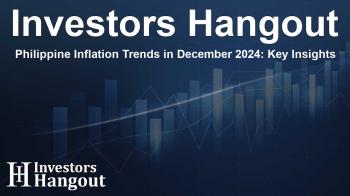Philippine Inflation Trends in December 2024: Key Insights

Philippine Inflation Trends in December
In December, the annual inflation rate in the Philippines rose to 2.9%, according to the latest report from the statistics agency. This increase was primarily driven by higher costs in food and utilities, indicating a notable change from the 2.5% recorded in the previous month.
Economic Expectations and Predictions
Economists who participated in a recent Reuters poll had forecasted an annual inflation rate of around 2.6% for December. This prediction aligned closely with the central bank's anticipated range of 2.3% to 3.1%, showing a general consensus on the economic outlook.
2024 Inflation Overview
The December inflation figure brings the average inflation for 2024 to approximately 3.2%. This is a significant development, as it falls comfortably within the central bank's target range of 2% to 4%, a level that has not been achieved since 2021.
Inflation Trends from Previous Years
In the past two years, consumer price increases have consistently exceeded the central bank's targets. Both 2022 and 2023 witnessed inflation readings that breached these ranges, raising concerns over economic stability and purchasing power.
Impact on Consumers
The rise in inflation rates directly impacts consumers, affecting their purchasing power and overall economic well-being. As food and utility prices climb, families may need to adjust their budgets, perhaps prioritizing essential goods over discretionary spending.
Central Bank's Response
In light of the recent inflation trends, the central bank may consider adjusting its monetary policy to stabilize prices and support economic growth. By managing interest rates and other financial mechanisms, it aims to keep inflation within the target cadre.
Future Forecasts
Looking ahead, analysts are keenly observing how both external factors, like global market trends, and internal policies affect inflation rates in the Philippines. With a more stable inflation trajectory, there is hope for a more predictable economic environment.
The Role of Food and Utilities in Inflation
Food and utility costs are significant contributors to inflation. Conversations around agricultural productivity, energy pricing, and supply chain efficiencies continue to play a vital role in shaping these costs.
Frequently Asked Questions
What drove the inflation rate up to 2.9% in December?
The increase was primarily due to rising costs in food and utilities, as reported by the statistics agency.
How does the December inflation figure compare to previous months?
December's figure represents an increase from the 2.5% recorded in November, indicating a quickening in inflation trends.
What is the average inflation rate for 2024?
The average inflation for 2024 is calculated at approximately 3.2%, aligning with the central bank's target range.
Why is the inflation target range important?
The inflation target range helps to stabilize prices and guide monetary policy, ensuring economic stability for consumers and businesses.
What concerns do economists have regarding inflation?
Economists are wary of rising inflation rates impacting consumer purchasing power and the overall economic environment, especially given the past two years of exceeding target rates.
About Investors Hangout
Investors Hangout is a leading online stock forum for financial discussion and learning, offering a wide range of free tools and resources. It draws in traders of all levels, who exchange market knowledge, investigate trading tactics, and keep an eye on industry developments in real time. Featuring financial articles, stock message boards, quotes, charts, company profiles, and live news updates. Through cooperative learning and a wealth of informational resources, it helps users from novices creating their first portfolios to experts honing their techniques. Join Investors Hangout today: https://investorshangout.com/
Disclaimer: The content of this article is solely for general informational purposes only; it does not represent legal, financial, or investment advice. Investors Hangout does not offer financial advice; the author is not a licensed financial advisor. Consult a qualified advisor before making any financial or investment decisions based on this article. The author's interpretation of publicly available data shapes the opinions presented here; as a result, they should not be taken as advice to purchase, sell, or hold any securities mentioned or any other investments. The author does not guarantee the accuracy, completeness, or timeliness of any material, providing it "as is." Information and market conditions may change; past performance is not indicative of future outcomes. If any of the material offered here is inaccurate, please contact us for corrections.
